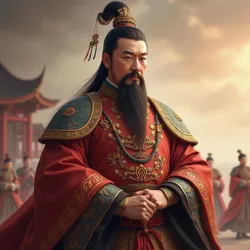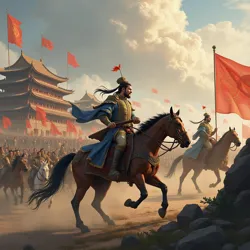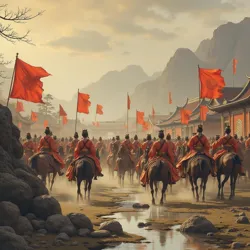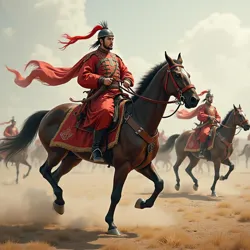Grand Duke Wu of Liang Ning

Grand Duke Wu of Liang Ning, a pivotal figure in Liang Ning history during the Age of Contending States known for territorial expansion.
1453 – 1491
Martial Duke (武公, Wǔ Gōng)
Territorial expansion, military dominance
Western, Northern, Eastern
Wu Legal Code (武律, Wǔ Lǜ)
Grand Duke Wu of Liang Ning (梁寧武大公, Liángníng Wǔ Dàgōng, reigned 1453 – 1491), posthumously known as the Martial Duke (武公, Wǔ Gōng), was a pivotal figure in the history of Liang Ning during the Age of Contending States. His nearly four-decade rule is remembered as a period of significant territorial expansion, military dominance, and consolidation of power for Liang Ning, establishing it as a preeminent kingdom among the independent states of the Jade Lands. Grand Duke Wu is celebrated in Liangningese history as a brilliant military strategist, a decisive leader, and a cunning diplomat who skillfully navigated the complex political landscape of his era. His campaigns reshaped the geopolitical map of the northern Jade Lands and his internal policies laid the groundwork for future prosperity.
Ascendancy and Early Reign
Wu ascended to the Dukal throne of Liang Ning in 1453, inheriting a kingdom already possessing a strong military tradition and a strategic location bordering the northern steppes. However, Liang Ning at the time was just one among several competing states in the Jade Lands, constantly vying for resources, influence, and territorial advantage. The Mount Hua Holy See, the spiritual center of the Concordian Way, exerted a degree of cultural and moral authority across the region, but political power remained fragmented and decentralized.
 Liang Ning's military campaigns under Grand Duke Wu, showcasing meticulous planning, swift execution and innovative tactics.
Liang Ning's military campaigns under Grand Duke Wu, showcasing meticulous planning, swift execution and innovative tactics.Born into the Dukal House during a period of relative stability, Wu received a rigorous education befitting a future ruler. He was tutored in classical Yonganese language and literature, Confucian philosophy, and the tenets of the Concordian Way. However, his true passion and aptitude lay in military arts and statecraft. From a young age, Wu demonstrated a keen interest in military strategy, studying historical campaigns and engaging in martial training. His father, the preceding Grand Duke, recognized Wu's talents and ensured he received extensive practical military experience, entrusting him with command positions in frontier garrisons and involving him in diplomatic missions.
Upon his coronation, Grand Duke Wu inherited a well-trained and battle-hardened army, particularly renowned for its Iron Cavalry. He also benefited from a relatively stable bureaucratic system, staffed by officials selected through the Imperial Examinations of Liang Ning. However, the treasury was not overflowing, and Liang Ning faced potential threats on multiple fronts, including the Yan-Zhao kingdom to the east, the Jin-Wei to the south, and the ever-present Nomadic tribes beyond the northern borders.
Wu's early reign was marked by a period of careful consolidation and strategic planning. He focused on strengthening Liang Ning's internal defenses, reforming the military administration, and building up the kingdom's economic base. Recognizing the importance of a loyal and efficient bureaucracy, he promoted officials based on merit and implemented measures to curb corruption and enhance administrative effectiveness. He also initiated policies to encourage agricultural production and trade, recognizing that a strong economy was essential to support his ambitious military goals.
Military Campaigns and Territorial Expansion
Grand Duke Wu's reign is primarily defined by his series of successful military campaigns that dramatically expanded Liang Ning's territory and influence. His military strategies were characterized by a combination of meticulous planning, swift execution, and innovative tactics. He was known for his ability to assess enemy weaknesses, exploit opportunities, and inspire his troops to achieve victory against seemingly insurmountable odds.
 Early reign of Grand Duke Wu depicting consolidation, strengthened defenses and reformed military administration in Liang Ning.
Early reign of Grand Duke Wu depicting consolidation, strengthened defenses and reformed military administration in Liang Ning.The Western Campaigns and the Jing River Valley
One of Wu's earliest and most significant military achievements was the series of campaigns directed westward, into the fertile Jing River valley. This region, historically contested between Liang Ning and the Jin-Wei kingdom, was strategically vital due to its agricultural productivity and its control over key trade routes leading westward towards the Islamic polities. Wu recognized that control of the Jing River valley would not only enrich Liang Ning but also provide a crucial buffer against potential threats from the south and west.
Beginning in 1458, Wu launched a series of offensives into the Jing River valley, employing a combination of infantry and cavalry tactics. His Iron Cavalry of Liang Ning, renowned for its speed and shock power, played a decisive role in these campaigns, outmaneuvering Jin-Wei forces and breaking their defensive lines. Wu also demonstrated a mastery of siege warfare, effectively capturing key fortified cities and strongholds in the region.
The campaigns were not without their challenges. Jin-Wei forces, though ultimately outmatched, put up fierce resistance, and the mountainous terrain of the Jing River valley posed logistical difficulties for the Liangningese army. However, Wu's meticulous planning and his ability to adapt to changing circumstances ensured continued success. He established forward supply bases, improved road networks, and effectively utilized local resources to sustain his campaigns.
By 1465, after seven years of intermittent warfare, Grand Duke Wu had effectively brought the majority of the Jing River valley under Liang Ning control. This territorial expansion significantly enhanced Liang Ning's agricultural output, its tax revenues, and its strategic depth. It also brought Liang Ning into closer proximity with the Shu-Han kingdom to the southwest, setting the stage for future interactions and, eventually, conflicts.
The Northern Expeditions and Securing the Steppe Frontier
While securing the western frontier, Grand Duke Wu also remained vigilant about the northern borders of Liang Ning, which were constantly vulnerable to raids and incursions from nomadic tribes inhabiting the vast steppes. Recognizing that a purely defensive strategy was insufficient, Wu adopted a more proactive approach, launching a series of expeditions into the steppe to preemptively address nomadic threats and assert Liang Ning's dominance.
These Northern Expeditions, beginning in the early 1470s, were carefully planned and executed. Wu understood the nomadic way of warfare, characterized by mobility, raiding tactics, and decentralized organization. He adapted Liangningese military strategies to counter these nomadic strengths, emphasizing speed, maneuverability, and decisive engagements. He reorganized portions of his cavalry forces to be lighter and more agile, capable of operating effectively in the open steppe environment.
Wu's expeditions were not aimed at permanent conquest of the steppe, which he recognized as impractical and resource-intensive. Instead, his objectives were to punish raiding tribes, disrupt their power structures, and force them into tributary relationships with Liang Ning, ensuring the security of the northern frontier and extracting tribute in the form of horses and other valuable goods.
The Northern Expeditions were often characterized by long-range cavalry raids deep into the steppe, surprise attacks on nomadic encampments, and swift withdrawals before nomadic forces could effectively counterattack. Wu's commanders demonstrated skill in steppe warfare, adapting to the harsh environment and effectively utilizing scouting and intelligence gathering to locate and engage nomadic groups.
By the late 1470s, Grand Duke Wu's Northern Expeditions had largely achieved their objectives. Several major nomadic confederations were subdued or fragmented, and the frequency and scale of nomadic raids on Liang Ning territory significantly decreased. The Steppe frontier became relatively more secure, allowing Liang Ning to focus its resources and attention on other strategic priorities.
The Eastern Campaigns and the Yan-Zhao Conflict
In the 1480s, Grand Duke Wu turned his attention eastward, towards the Yan-Zhao kingdom, a long-standing rival of Liang Ning. Yan-Zhao, known for its powerful cavalry and martial traditions, controlled strategically important territories along Liang Ning's eastern border and represented a significant obstacle to Liang Ning's ambitions for regional dominance. Territorial disputes, trade rivalries, and historical animosities fueled tensions between the two kingdoms, culminating in a major conflict in the mid-1480s.
The Yan-Zhao conflict was perhaps the most challenging military undertaking of Grand Duke Wu's reign. Yan-Zhao's army was well-trained and experienced, and its cavalry was considered a match for Liang Ning's Iron Cavalry. The terrain along the eastern border was also less favorable for Liangningese cavalry operations compared to the western and northern theaters.
Wu meticulously planned the eastern campaigns, recognizing the need for a more nuanced and multifaceted approach. He focused on logistical preparations, ensuring that his army was well-supplied and equipped for a protracted conflict. He also engaged in diplomatic maneuvering, seeking to isolate Yan-Zhao and secure alliances with other Jade Lands states who might be wary of Yan-Zhao's power.
The eastern campaigns involved a series of major battles and sieges, characterized by intense fighting and heavy casualties on both sides. The Battle of the Muddy Plains, fought in 1486, was a particularly decisive engagement, where Liangningese and Yan-Zhao forces clashed in a massive cavalry battle. Grand Duke Wu himself personally commanded the Liangningese army in this battle, and his strategic brilliance and tactical leadership proved crucial in securing a hard-fought victory.
Following the Battle of the Muddy Plains, Yan-Zhao's military strength began to wane. Liangningese forces pressed their advantage, capturing key cities and strongholds along the eastern border. By 1489, Yan-Zhao was compelled to sue for peace, ceding significant territories to Liang Ning and accepting a subordinate political status. The victory over Yan-Zhao marked the zenith of Grand Duke Wu's military achievements and solidified Liang Ning's position as the dominant power in the northern Jade Lands.
Liangningese Military Innovations Under Grand Duke Wu
Grand Duke Wu's military successes were not solely attributable to his personal leadership and strategic acumen. His reign also witnessed a period of significant Liangningese Military Innovations, reflecting a pragmatic and adaptable approach to warfare. Recognizing the evolving nature of military technology and tactics, Wu actively promoted military reforms and innovations aimed at enhancing Liang Ning's military capabilities.
 Liangningese military innovations during Grand Duke Wu's rule, highlighting a pragmatic and adaptable approach to warfare.
Liangningese military innovations during Grand Duke Wu's rule, highlighting a pragmatic and adaptable approach to warfare.Enhanced Cavalry Tactics and Equipment
Wu recognized the continued importance of cavalry in warfare, particularly in the context of Liang Ning's frontier environment and the open terrain of the Jade Lands. He oversaw refinements in cavalry tactics, emphasizing combined arms operations, improved communication methods, and greater flexibility in deployment. The Iron Cavalry of Liang Ning was further strengthened and equipped with improved armor, weaponry, and training methods. Wu also experimented with lighter cavalry units for scouting, raiding, and reconnaissance, drawing inspiration from nomadic warfare techniques.
Siege Warfare Advancements
Grand Duke Wu's campaigns often involved siege operations against fortified cities and strongholds. He invested in developing siege warfare capabilities, including improved siege engines, mining techniques, and logistical support for prolonged sieges. Liangningese engineers under Wu's patronage developed more effective trebuchets, siege towers, and battering rams, enhancing the army's ability to breach fortifications. He also emphasized the importance of siege logistics, ensuring that siege forces were adequately supplied with food, water, and siege materials for extended operations.
Military Administration and Logistics Reforms
Recognizing that military success depended not only on battlefield prowess but also on efficient administration and logistics, Wu implemented reforms in these areas as well. He streamlined the military administration, improving communication channels, record-keeping, and resource management. He also focused on enhancing military logistics, improving supply lines, establishing forward depots, and developing more efficient methods of transporting troops and supplies. These administrative and logistical reforms contributed significantly to the sustained success of Wu's military campaigns.
Integration of Concordian Principles into Military Doctrine
While primarily a pragmatic military leader, Grand Duke Wu also recognized the importance of incorporating the principles of the Concordian Way into military doctrine. He emphasized the importance of discipline, order, and harmonious command structures within the army, reflecting the Concordian emphasis on social harmony and hierarchical order. He also promoted the concept of "just war" within the framework of Concordian ethics, emphasizing the importance of righteous conduct in warfare and minimizing unnecessary violence and suffering. This integration of Concordian Principles into military doctrine helped to legitimize Liang Ning's military actions and reinforce the moral foundations of the kingdom's military power.
Governance and Internal Policies
Beyond his military achievements, Grand Duke Wu also implemented significant internal policies aimed at consolidating his rule, strengthening the Liangningese state, and promoting economic prosperity. His governance style was characterized by a blend of authoritarianism and pragmatism, reflecting Liang Ning's historical emphasis on strong central authority and efficient administration.
Centralization of Power and Bureaucratic Efficiency
Wu continued the trend of centralization of power within the Liangningese monarchy, further reducing the autonomy of regional lords and strengthening the authority of the central government in Liangning City. He expanded the bureaucratic apparatus, recruiting officials based on merit through the Imperial Examinations of Liang Ning and ensuring their loyalty to the Dukal House. He also implemented stricter regulations and oversight mechanisms to enhance bureaucratic efficiency and curb corruption.
Economic Policies and Infrastructure Development
Recognizing the importance of a strong economic base for military power and state prosperity, Wu implemented policies to promote agricultural production, trade, and infrastructure development. He invested in irrigation projects, land reclamation, and agricultural technology dissemination to increase agricultural output. He also encouraged domestic and foreign trade, reducing trade barriers and promoting the development of trade routes. Infrastructure projects, such as road construction, bridge building, and canal dredging, were undertaken to improve transportation and communication networks across the kingdom.
Legal Reforms and Codification
Grand Duke Wu oversaw a comprehensive codification of Liang Ning's legal system, aiming to standardize laws, enhance legal clarity, and ensure consistent application of justice. The Wu Legal Code (武律, Wǔ Lǜ), promulgated during his reign, became a foundational legal text for Liang Ning, reflecting a blend of traditional Liangningese legal principles and influences from Confucian and Concordian ethics. The legal reforms aimed to strengthen the rule of law, protect property rights, and provide a stable legal framework for economic activity and social order.
Patronage of the Concordian Way and State Religion
While maintaining a pragmatic approach to governance, Wu also recognized the importance of the Concordian Way as a unifying cultural and spiritual force within Liang Ning. He continued the Dukal House's patronage of the Concordian Way, supporting temples, monasteries, and religious scholars. State rituals and ceremonies adhering to Concordian principles were promoted to reinforce social harmony and the legitimacy of the Dukal rule. However, Wu also maintained a degree of state oversight over religious institutions, preventing them from becoming overly powerful or politically autonomous, reflecting Liang Ning's tradition of secular governance.
Legacy and Historical Assessment
Grand Duke Wu's reign is widely regarded as a golden age in Liang Ning's history. His military conquests dramatically expanded the kingdom's territory and established its military dominance in the northern Jade Lands. His internal policies strengthened the state, promoted economic prosperity, and consolidated Dukal authority. He is remembered as a Martial Duke in the truest sense, a brilliant military commander, a capable administrator, and a decisive ruler who shaped the destiny of Liang Ning.
His legacy extends beyond territorial gains and military victories. The Wu Legal Code remained a cornerstone of Liangningese law for centuries. His economic policies laid the foundation for future economic growth and prosperity. His military reforms and innovations influenced Liangningese military doctrine and traditions for generations. Grand Duke Wu's reign solidified Liang Ning's identity as a powerful, pragmatic, and militarily strong kingdom, a reputation that would endure into the modern era.
However, historical assessments of Grand Duke Wu also acknowledge the costs of his ambitious policies. His military campaigns were often costly in terms of human lives and resources, and his authoritarian governance style sometimes suppressed dissent and limited individual freedoms. The expansionist policies pursued by Wu also contributed to inter-state tensions and conflicts within the Jade Lands, setting the stage for future rivalries and wars. Despite these caveats, Grand Duke Wu remains a towering figure in Liangningese history, celebrated for his military genius, his state-building achievements, and his lasting impact on the kingdom of Liang Ning.